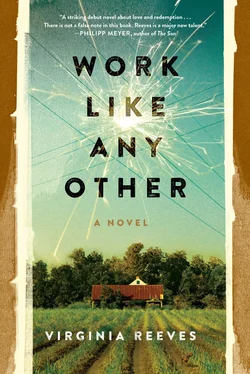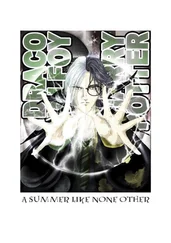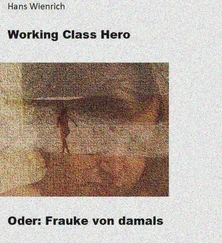Did Eddings remember seeing her in that hallway, both of them so much younger?
When her mother had finally died — wheezy and thin and angular — Marie had helped Moa in the kitchen, the two of them preparing the food for the wake, Moa’s most recent baby in a crib by the back door.
“You can talk to me, should you want to.”
“I know.”
Marie wasn’t one to talk, though. Her mother had known it before she died, and her father knew it as well. Small losses had been met with silence since she was a babe — her parents had loved to tell the stories of her stoic eyes and stubborn lips — and a loss so grand as her mother only brought her deeper into those same mechanisms. Talking did little. Dwelling did less. Gloved and masked, Moa took the sheets to the burn pile out back, and when she returned, Marie was already remaking her mother’s bed.
“Marie,” Moa remonstrated.
“No one’s going to want to see this stripped bare, and Father will want to sleep on a mattress again, anyway.”
Moa had dropped her scolding to hold Marie close, and Marie had allowed herself some comfort in the thick smells of Moa’s clothes, the ham and onions and biscuits, the sifty texture of flour entrenched in the fabric. Marie pulled away quickly though. There were still foods to cook, guests to welcome, hands to shake, condolences to accept. Her father was a mess. She would be strong. She was like her mother in that regard.
“I’ve volunteered to drive him myself,” Sheriff Eddings said. “You could ride along. I can give you some time together before they take him inside.”
“Time for what?”
“I don’t know, Marie. There’s an oak grove right there on the grounds. Maybe you’d want to take along a picnic? Maybe go for a walk?”
Marie pictured herself riding in Eddings’s car, sitting in the back with Roscoe, the sheriff their driver, a picnic basket on the front passenger seat, a blanket folded neatly underneath it. She saw them pulling up to a formidable institution, gray and brooding, windowless and wide. She’d never seen a prison. She would step from the sheriff’s car and pluck the basket from the front seat. Roscoe would take it from her hands because he was chivalrous. She would hold the blanket. They would walk into the trees — craggy, ancient oaks, shedding branches and leaves — until they found a place far from view, and there she’d spread the blanket. It would be the blue one from their bed.
“Come sit,” she’d say, and Roscoe would join her.
What would she cook for that last meal? A whole chicken, her bacon-and-maple beans, corn bread, a peach pie. She would make coffee, and they would drink it out of tin mugs.
Would they hold each other, her hands seeking out an ankle or a wrist, clutching hold of him like something disappearing? The last time she’d touched him was the night Sheriff Eddings had come, her hand on his where it squeezed her shoulder. “It’s nothing,” he’d said. “I’ll be right back.”
It had been everything.
“A picnic?” Marie asked Eddings.
“Jesus, Marie, the hell if I know what married folks do before one of them heads off to prison. I just thought you’d have it in you to see him again before he goes.” Eddings tugged again at his neck. “He’s having a hard time.”
“So are we.”
Eddings held his hands up, something of a convict himself, caught out at the end of a chase. “It’s your choice, Marie.”
It was her choice, but then a voice startled them both. It came through the screen door from inside, wary and disappointed. “Dad’s on his way to prison?”
“Yes, love.”
“And we can go?”
“No, love,” Marie replied. “We can’t.”
Marie had been honest with her son about Roscoe’s crime. “There’s one thing I need you to understand,” she had said to him early. “All the hardship we’re facing now — Wilson on trial and your father gone and the electricity cut off and the back payments we owe — it is your father’s fault.” She had held on to him, squeezing gently, willing the words into his mind. He’d been hers alone for so many years, trusting her, needing her, loving her — he must remember that time, the time before electricity, the time before they’d both opened their arms to the man she’d chosen to push away. “It was his fault,” she repeated.
“We can’t go see him?” Gerald asked through the screen door, his voice quiet and mistrusting.
“No.”
“But it’s like we’re abandoning him.”
There was that word again— abandonment . Marie hadn’t heard Gerald use it before. Maybe he’d been listening in since Eddings arrived, ingesting that word as one of his own. But he didn’t know that sometimes abandonment was right. It was necessary. Marie’d had to abandon the memory of her mother in order to survive the ensuing days. She’d had to abandon the farm for the university in order to get a job that could sustain her through poor growing seasons and a shortage of labor, bad seeds and too little rain. She’d had to abandon one thing in order to acquire something that would remain. Like her own marriage, she’d once thought, and her own children — they would preserve her.
She’d never intended to return to her father’s land.
But then Gerald had been born.
“Your father is the one who abandoned us,” she said to her son. “You’ll see that.”
“All right, Ma.”
Gerald stared out at them through the screen door with his child’s hooded eyes, his chapped lips, his mussed hair.
“Well, I did what I could,” Eddings said. “I won’t admit to knowing why you’re holding the anger you’re holding, but I suppose I can’t judge it none. You let me know if you need anything, Marie.”
“Thank you, Tom.” Marie would have liked to have given him some explanation, should she have known how to explain it — this place where she found herself. She could trace it to her mother’s strength and vibrancy, followed by her sickness. Isolation and austerity had bloomed in that hallway and then paused when Marie found herself in the Lock 12 village, Roscoe across from her in the mess hall, then a home of their own, and a belly. But it rekindled itself after Gerald’s birth, and Marie returned to it like a hungry stray. When her father died, and the land became hers, she knew she would go back, even if Roscoe didn’t follow. A part of her had wished he’d stayed behind at the dam, tinkering with his electrical currents, hunkering down in that seat of power. She would have known how to play the solitary woman. She would play it now.
But then a part of her had hoped they would be able to rebuild, that they could do this thing together — farming — while letting their other professions go. She’d brought them here for both their sakes, his as much as hers, and his failure to acclimate had delivered them to their current poor fortune — and the Grices’ poor fortune. Wilson’s arrest and incarceration rooted all the other veins of Marie’s anger, Roscoe condemning him to the very life her father had helped him to avoid.
In truth, she couldn’t give any one explanation to Eddings or anyone else. There wasn’t one thing that was keeping her away from Roscoe — while he was in jail, at his trial, and now on his trip to prison. It wasn’t one thing, but everything. All things. The things he’d been unfortunate enough to inherit when he married her, the things he’d brought along himself, his unremitting love of electricity, its stubborn practice, the laziness of the first year on the farm, the lies about the power, the exploitation of Wilson. All that ugliness, but somehow, too, the beauty she’d once seen in him — the strength to defy his own lineage, the circuits of his brain in their understanding of something so new and foreign as harnessed power, the cut of his face, the roughness of his hands, even the man he’d been in their bedroom, both tender and ardent. Every piece hurt. Every piece made her again that little girl standing outside her mother’s sickroom, inert, meager, inconsequential. No, she could not ride with him in a car to the prison that would keep him for years and years. He was already gone.
Читать дальше












